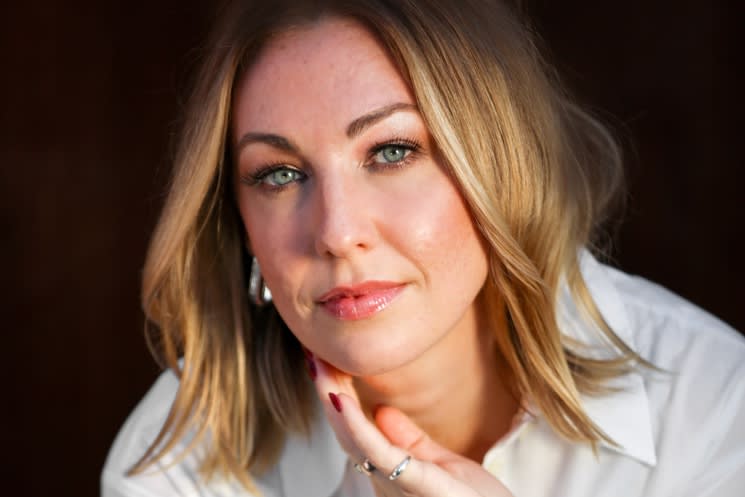In an alternative universe, writer and director Molly McGlynn would’ve been granted the budget to properly set her sophomore feature during the early 2000s when the filmmaker was coming of age — and been able to use the tagline "Not that kind of period movie" — but, by placing her characters in present day, Fitting In (out February 2 through Elevation Pictures) invites a fascinating comparison of how a diagnosis like MRKH (Mayer–Rokitansky–Küster–Hauser) syndrome is examined and cared for today versus 20 years ago.
A rare reproductive condition, MRKH syndrome presents at birth and is characterized by a missing or underdeveloped uterus and/or vagina, as well as a shortened vaginal canal. Over a Zoom call with Exclaim!, McGlynn recalls the support given when she received her diagnosis as a teen in New Jersey ("nothing") and the dark time that followed, as her parents sent her to see a psychiatrist who simply prescribed medication rather than making an attempt to understand what she was going through.
It was only until she moved back home to Canada for university that she began to find the information she required. McGlynn learned through a doctor at Queen’s University that there are two types of MRKH, one which could result in missing a kidney. When asked whether she had both her kidneys, McGlynn told the doctor she was unsure and called her mom, who was equally surprised that a missing kidney was even possible. "[There was a] complete lack of information," McGlynn says. "It was when I got back to Canada that there was better treatment of [MRKH]."
Compounding the emotional upheaval during this time in her life, McGlynn’s mother died when the director was 21 years of age. "She was first diagnosed with breast cancer when I was 13 [and] got her breasts removed when I was starting puberty," explains McGlynn. "To me, a woman's body was a bomb waiting to go off."
She continues, "A lot of the film is about how a mother and daughter relate, or don't, with each other, when their bodies are failing them in different ways. A really powerful part specifically was kind of an amends to my mother and seeing things differently with time, understanding her helplessness and her sometimes misguided attempts at connecting with me."
In the film, fellow Canadian Emily Hampshire steps into the mother role to Maddie Ziegler’s Lindy — McGlynn’s "vessel" for her own high school experience, as she describes it. We follow Lindy throughout the film as she navigates this new understanding of her body, while also navigating the typical highs and lows of adolescence. Through Ziegler’s magnetic performance, we squirm in our seats and furrow our brows as Lindy is subjected to invasive tests and the various poking and prodding of painful exams.
"A lot of those pelvic exam scenes and [the] humiliation of residents coming in sort of re-traumatized me and healed me," McGlynn recalls.
During filming, many of the female members of McGlynn’s crew approached her, sharing their own uncomfortable experiences that were purposely pushed away and forgotten. For McGlynn, this made clear to her that her rare medical diagnosis and everything that came with it was part of a common shared narrative. She explains, "I realized this isn't just my story anymore. This is a collective story and it is frighteningly universal. This experience of humiliation when it comes to female bodies in particular."
There’s a moment during one of Lindy’s invasive exams where she catches the "empathetic eye" of a younger female resident — Dr. Aranda, played by Rhoslynne Bugay. Dr. Aranda makes a second appearance toward the end of the film, offering Lindy a far more pleasant medical environment than her older male doctors had previously. "It was important for me [to recognize] there's a new generation of doctors as well," says McGlynn. "I'm hopeful that there is more empathy that's being brought into these spaces, and we’re not just treating bodies, we’re treating people."
In addition to diversifying the doctor pool to better represent the hospitals of today, Fitting In’s contemporary setting opened the door for Lindy to receive a sense of support McGlynn never did, whether through YouTube videos, online forums, support groups, or simply existing in a time where acceptance is more easily found. And while the internet has improved society in many ways in this particular instance, McGlynn and Fitting In weren’t immune from finding detractors online following the film’s premiere at last year’s SXSW Film Festival.
"I have had MRKH community people be extremely mad at me for insinuating the intersex angle [in the film] and have sent me messages to kill myself. I have heard intersex people say, why am I not just adamantly saying it's intersex?" McGlynn says equally bewildered and amused. "It's so funny, because I have people on both sides telling me what I am."
In a time when many insist upon clearly defined labels for people, McGlynn’s experiences grant her a different perspective that has her fighting against the grain, insisting against the insistence.
"What I am is something in between — words that I don't necessarily know, and that’s okay. Not every aspect of our identity can be easily classified."




